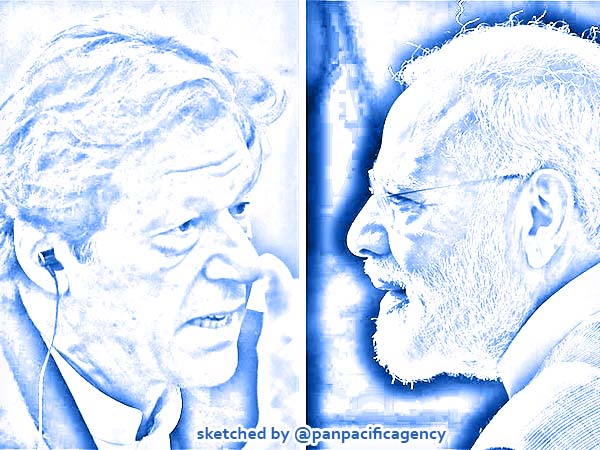India’s expansionist policies a threat to neighbours: Pakistani PM

Pakistani Prime Minister Imran Khan and Indian Prime Minister Narendra Modi are expected to meet in Russia in September. Image Credit: Reuters / AFP. Sketched by the Pan Pacific Agency.
ISLAMABAD, May 28, 2020, The Financial Times. Prime Minister Imran Khan Wednesday said that Hindutva Supremacist Modi government in India with its arrogant expansionist policies, akin to Nazi’s Lebensraum, is becoming a threat to neighboring countries, The Financial Times reported.
In a series of tweets on Wednesday, the Prime Minister referred to India’s border disputes with Nepal and China. The Premier compared the current Indian policies to the Nazi concept of ‘Lebensraum’, which comprised policies and practices of settler colonialism.
Imran Khan said that he has always maintained the fascist Modi government is not only a threat to India’s minorities by relegating them to 2nd class citizens’ status, but also to regional peace.
Detailing the threat of Indian policies, the Prime Minister said that New Delhi has border disputes with China and Nepal, tension over the Citizenship Act with Bangladesh and there is a threat of false flag operations against Pakistan.
PM Khan further said that India has carried out such actions after the illegal annexation of Occupied Jammu and Kashmir (IoJK), which is a “war crime under 4th Geneva Convention” and illegally claiming Azad Jammu and Kashmir (AJK).
Earlier, the Prime Minister termed Indian allegations of infiltration from Pakistan’s side of the Line of Control (LoC) baseless and said it is a “continuation of a dangerous agenda”.
He had also reminded the international community of its responsibility to act against the war crimes and genocide being perpetrated against the Kashmiri people in Indian Occupied Kashmir (IOK).
The Prime Minister had said the right-wing Indian government, under the cover of the pandemic, has continued its Hindutva supremacist agenda, driven by the fascist RSS ideology.
Tensions have flared up recently between Chinese and Indian troops in Ladakh’s Galwan Valley region. Both sides now reportedly have thousands of troops stationed on either side of the ceasefire line, leading observers to draw comparisons with the 2017 standoff between India and China in Doklam.
The trigger this time is India’s own actions in the disputed area. New Delhi’s construction of roads and airstrips in Ladakh is the most likely reason for drawing Beijing’s ire.